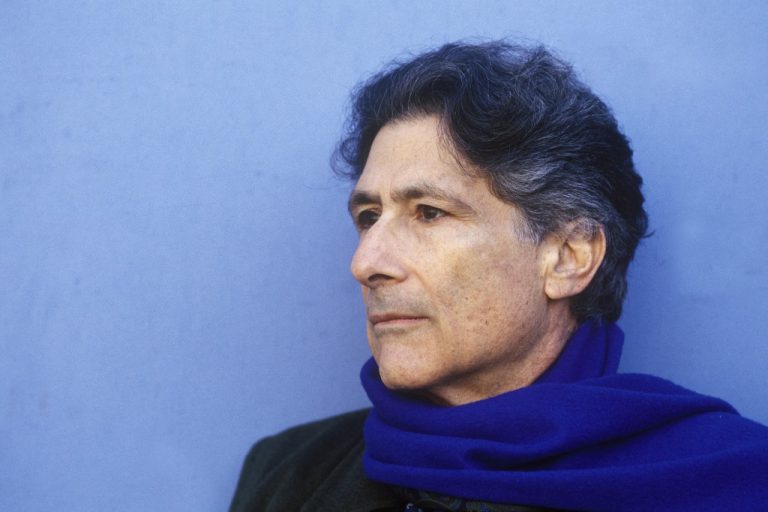São Paulo – The 20th anniversary of the death of Palestinian critic, essayist and academic Edward Saïd (pictured) will be celebrated in October at an international seminar held by Cátedra Edward Saïd of the Federal University of São Paulo (Unifesp), the Institute for Arab Culture (ICArabe), and the Social Service of Commerce of São Paulo (SESC-SP), with support from the Arab-Brazilian Chamber of Commerce (ABCC). The meeting will feature his wife Marian and daughter Najla, experts on his work, and special guests.
According to Unifesp professor and former dean Soraya Smaili, the organization of the seminar came from the Cátedra, an agency affiliated with the Unifesp, to celebrate the 20th anniversary of death of Saïd, study his work from the perspectivity of the present and the heritage left by his essays and arguments. “Saïd is timeless. He plays a part when you study the out of place, the alterity – it all begins with Orientalism. And he also discussed other issues including nationality and what it means to be an Arab in the West,” said Smaili.
SESC-SP regional director Danilo Santos de Miranda points out that the seminar aims to pay tribute to Saïd but also reflect on topical issues present in his work like origin, identity, exile, arts and sciences “in the context of the critique of the Universalist dimension that lacks common rights available to all,” and that for SESC-SP it gives the opportunity to contribute to a debate “that is on the agenda.”
“After 20 years of the death of Edward Saïd, these topics remain present in our society amid the expansion of postcolonial and decolonial studies, for instance, and the demands of identity movements. In this sense, this seminar proposes a timely study of the complexity of the thinking of Edward Saïd as a way to bring new perspectives on the issues of the present,” said Miranda.
Saïd was born in 1935 in Jerusalen. He was son of Arab Christians and lived his boyhood in Cairo, Egypt, before moving to the United States in his teenage years. He was a professor at Columbia University in New York, where he died on 25 September 2003 after enduring a 12-year sickness with leukemia. He is the author of several books including Orientalism, Culture and Imperialism, Humanism and Democratic Criticism, and Reflections on Exile.
His thinking was based on the concept and critique of the view and values that the West have on the East. He denied the appraisal that critics had of him as the founder of postcolonial studies, as he believed that the colonialism didn’t stop existing. An advocate for the State of Palestine, he was critic of the Oslo Accords, an attempt to end the conflicts in Palestine, and former chairman of the Palestine Liberation Organization (PLO) Yasser Arafat (1929-2004), from who he distanced himself.
In addition to Saïd’s wife and daughter, the two-day event will feature panels with writer Milton Hatoum; emeritus professor of Literary Theory and Comparative Literature at the University of São Paulo (USP), Walnice Nogueira Galvão; poet, translator and Arabic professor at USP Michel Sleiman; professor of International Law and coordinator of the Global Law and Development Center of the FGV think tank, Salem Nasser; professor of Cultural Anthropology at the La Sapienza University in Rome, Massimo Cavenacci; and Humanities professor of the University of Minnesota and biographer of Saïd, Timothy Brennan; as well as other scholars the delve into the work of Saïd and the Arab culture.
“The seminar will bring researchers from Lebanon and the Arab world with important work about the world from the Arab countries. It is important to bring that to the debate. We can have a joint construction. When he talks about dialogue and coexistence, it is about doing and building together. That’s why his work is so timeless,” said Smaili.
For the Marketing and Communication vice president of the ABCC, Silvia Antibas, the seminar keeps Saïd’s ideas in evidence. “Edward Saïd is increasingly contemporary; everything he said can be fully adapted to today, on topics such as the diaspora, orientalism, it is still very current today,” she said. She also recalled it would be a moment to pay tribute to professor Olgária Matos, the Edward Saïd Cátedra coordinator.
The seminar will be held on October 10 and 11, starting at 10:30 am BRT at the SESC São Paulo Research and Training Center. The in-person event has free admission, but registration is required. For more information, click this link.
Translation by Guilheme Miranda & Elúsio Brasileiro




